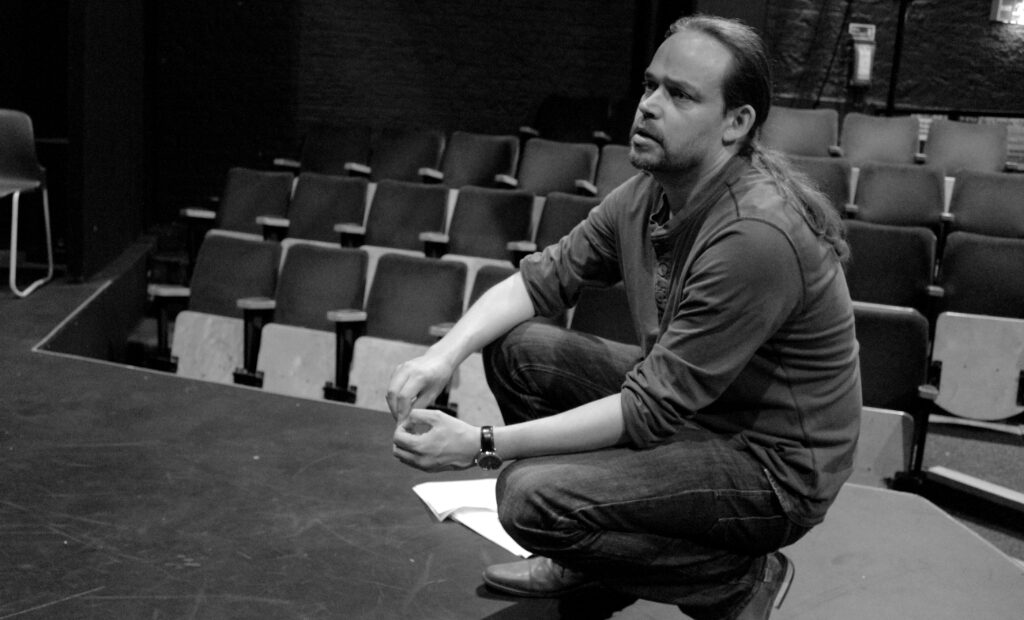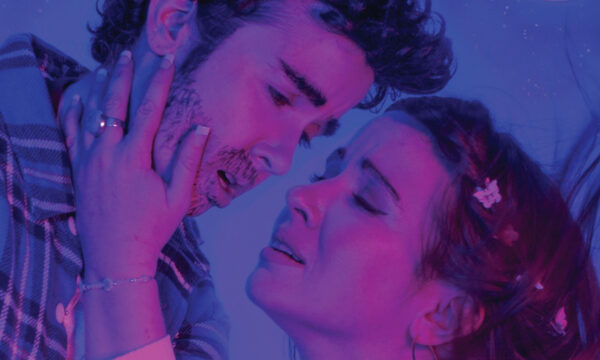The Wolves of Willoughby Chase: An interview with James Haddrell, artistic director of Greenwich Theatre

The craving to get outdoors, breathe the Christmas atmosphere and enjoy a live show – socially distanced of course – is undeniable, even in the freezing weather: storytelling could be the cure for a hard month. It’s been an exhausting year for the arts, and theatre is among the worst hit. Greenwich Theatre has always nurtured a strong relationship with its locals, and nowadays the community’s support is more valuable than ever, but while COVID raged, Greenwich Connects was what kept the theatre in touch with its audience. The launch of the online programme of interactive theatre opportunities, and the creative commitment of their company, actually allowed them to reach a wider audience in the face of adversity. Greenwich Theatre became a life-sustaining institution in the middle of a pandemic that took human warmth away.
Now, the venue is about to kick off its festive season with a thrilling family show, The Wolves of Willoughby Chase, adapted from Joan Aiken’s novel by Russ Tunney. Here, artistic director James Haddrell shares his thoughts on the highs and lows of 2020, and gave us an insight into the show and its making, the role of music, what children’s stories can tell adults, and how the parallel digital version of the production will be structured. Read on to find out more.
James, thank you for your time. It’s very exciting that theatres have reopened! What have you missed the most during the period of lockdown?
I’ve obviously missed going to the theatre (I’m usually at a show three or four times a week), but I think more than that I’ve missed spending time with our emerging companies, being in the room while they’re developing new work. Very often that takes place here at Greenwich Theatre, and seeing the building stand empty for so long has been heartbreaking. Thanks to support from Arts Council England we have been lucky enough to be able to support a range of companies online, programming their work, helping them cross over from live to online performance, nurturing a new approach to communicating with audiences. But nothing beats being in a rehearsal room with a group of artists as a show begins to come together.
Tell us a bit more about Greenwich Connects.
At Greenwich Theatre as the first national lockdown was announced, we knew that we had two choices: we could either close the doors and put a sign up saying “See you when it’s all over,” or we could recognise the horrendous time that audiences and artists were facing, and do whatever we could to continue our work in providing entertainment, opportunities for community participation and professional development activities. We clearly chose the latter, so within days we had launched an online programme of work for families, theatregoers, and artists. Every week we would stream a show, showcase an emerging company, offer industry advice days and invite writers to submit scripts – several of which we have since presented as semi-staged online readings. We also transferred our annual children’s theatre festival online, and granted three micro-grants to companies looking at launching new ways of working online (one of which, LAStheatre, has since presented a live, interactive cook-along for children, direct from the stage of Greenwich Theatre). My highlight of the programme has to be our online production of The Secret Love Life of Ophelia. The play, by Steven Berkoff, is written for two actors, and imagines an exchange of letters between Hamlet and Ophelia, using the action of Shakespeare’s play as a backdrop to their relationship – from first meeting to Ophelia’s tragic death. Steven granted us the rights to present the show in a very different way, staged online with the letters reimagined as video messages, and with 39 young, emerging or marginalised actors performing a letter each. The play traditionally ends with a voiceover from Gertrude, Hamlet’s mother, taken directly from the original play, informing Hamlet that Ophelia has died. Our patron, Dame Helen Mirren, recorded that final piece as a video message to close the show. Thousands of people watched the production, giving those young actors an incredible showcase opportunity and international press attention, at a time when they had no other way of being seen by casting directors, producers or agents.
What were the main challenges of setting an online programme?
The key challenges were inevitably all technical. We had no problem finding industry experts to donate their time for advice sessions, finding companies wanting to share their work online or coming up with ideas for the programme, but our business is live performance so we had to learn a lot in a very short time about how best to reach people and how best to share work online. They are all lessons that we will hold onto long after the pandemic is over – this will definitely go down in history as the year that changed theatre.
Focusing on local communities has been vital in the past few months. Greenwich Theatre has always had that relationship – how has it changed in 2020?
The main change has been in the way we think about community. We have managed to retain our local relationships with audiences, but we have found an increasing number of people engaging with our work online, who live all around the country. It is ironic that lockdown has actually increased the geographic scope of what we would consider our “community”.
How has your role as artistic director changed in this reopening phase?
At its core my job remains the same: I am programming, directing shows and working with the team to make strategic decisions about the future. I am lucky to have a small but very dedicated team around me who are focusing on the challenges of social distancing with audiences, working out ways of keeping the front-of-house team in bubbles, changing the approach to cleaning the building etc. Having said that, one change is that everything I do now has to have a contingency plan – what happens if we go back into lockdown, or if an actor or a member of stage management has to self-isolate? I also have to approach the theatre’s financial management in a very different way; working with our commercial director, we have to find a way to survive a year with months of inactivity and the loss of the pantomime.
How did you first approach the production of The Wolves of Willoughby in this new “normal”?
I was determined that Greenwich Theatre be among those able to present a festive show this year, and I’ve been aware of Russ Tunney’s adaptation of the book for a few years now. I had to find a production that could be presented with social distancing in place on stage and that could work economically with social distancing in the audience, but that could still feel like a festive treat. The last thing I wanted was some kind of artistic compromise, relying on the audience’s forgiveness for having to work in a particular way because of the pandemic. I want audiences to forget that the actors aren’t going near each other, that they’re not touching the same props or parts of the set. We’re working really hard to make sure the show flows, that nothing gets in the way of us telling an exciting, fun, festive tale.
How was collaborating with Russ Tunney? Did you give any new shape to his adaptation?
The adaptation already existed, but Russ and I certainly had conversations about our approach to casting – in particular, in casting our regular pantomime villain, Anthony Spargo, as the wicked governess Miss Slighcarp. This isn’t a pantomime, and the villain certainly isn’t a dame, but we’ve found a lot of fun and a lot of comedy in this particular casting decision. I can’t wait to see what audiences make of his double act with the dim-witted henchman Mr Grimshaw (also cast against gender, played by Serin Ibrahim).
Can you reveal your favourite character in the show?
Well Miss Slighcarp is certainly a show-stopper!
How important is the music component in this production? Does it differ from others?
The music is incredibly important in this show, not only in the songs but in underscoring scenes, creating the world, enhancing the excitement of the girls’ adventure. We play a lot with the conventions of including music in a show. Are the actors aware of the musician on the side of the stage? Does he have aspirations towards acting? Does the music respond to the jokes or create them? The musical director is definitely a character in his own right, and in many ways so is the music.
Children’s stories often have deep, universal relevance. What do you think The Wolves of Willoughby Chase tells us?
The original novel, though written for children, has a lot to say about evil, and the mistakes we make in attributing evil. The idea that evil wolves roam the countryside, threatening the safety of the civilised classes, is proved to be nonsense. The true threat in Joan Aiken’s novel comes from those who seek to take over Willoughby Chase, to send the children to a barely disguised workhouse and steal the family’s money. I think the story tells us that we should interrogate the things we think we know, as much as those we don’t. However, like all good adventure stories, it also tells us that we can overcome adversity, no matter how badly the odds seem to be stacked against us. Russ Tunney’s adaptation has all of that, but it also celebrates the sheer joy of storytelling and of theatre – something that we need to hang on to right now.
You’re also offering an interactive online adventure called Sir Willoughby’s Challenge – can you tell us about that?
Without giving too much away, children who join us for the online challenge will work with characters from the original story to complete a series of puzzles and activities to solve a mystery. Online escape rooms have become popular entertainment for adults during lockdown and this will replicate some of those structures, but will also give children the chance to interact with performers and characters from the live show.
Do you see more digital theatre experiences in the future?
Absolutely. Theatres everywhere have spent this time discovering new ways to relate to their audiences. We are working with companies who are using the internet to reach audiences across the world to support the development of multilingual theatre, who are integrating online gaming technology into interactive theatre, who are considering how to play to audiences in theatres and at home at the same time. None of those lessons will be lost. Anything that increases the reach of live theatre has to be a good thing.
It’s panto season – if in a new guise. What’s your favourite panto story?
That’s a tough one, but I do like seeing new stories brought into the pantomime canon, or brought back. Robin Hood was very popular a century ago, but is rarely produced now… Robinson Crusoe has suffered the same fate. In Easter 2021, we are set to present our pantomime version of The Queen of Hearts, which I am very excited about.
What are your plans for this month? Have you booked tickets for any theatre shows?
I can’t wait to get back to seeing live shows. Once The Wolves Of Willoughby Chase is open I’m looking forward to seeing the pantomime at the Turbine Theatre and the new musical The Sorcerer’s Apprentice at Southwark Playhouse. I’m also now working on plans for a very different show here at Greenwich Theatre in February – announcements to come in the weeks ahead!
Cristiana Ferrauti
For further information about The Wolves of Willoughby Chase or to book tickets visit Greenwich Theatre’s website here.

























Facebook
Twitter
Instagram
YouTube
RSS